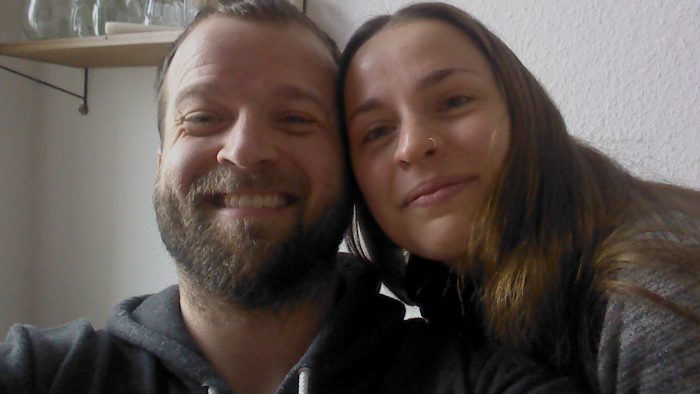When I was 13, our Doberman Cora died.
She was only four years old, and as wild and cheerful as they come, so her death was a surprise. The vet couldn’t figure out what was wrong with her in time, though I believe she died of heartbreak from missing our Irish Setter Robby who had just passed away, too.
I remember the day of her death clearly. My mom called me while I was on a school excursion to Robert Schumann’s birthplace. Sitting on the tram, I started crying right away. But then, something happened that little me hasn’t forgotten or forgiven until today. Later that day, my mom picked me up from school and told me they had already buried Cora—without me.
I didn’t get the chance to say goodbye.
Today, I find myself in a similar situation. A dear friend just passed away suddenly, at the age of 36.
We’d known each other since I was 18 and had developed one of those friendships where you always feel connected to the person, no matter how often you speak or see each other. And, whenever you do, it feels like no time has passed, and you can talk about anything. Since he moved back to the United States a few years ago, the news of his death traveled slowly, and I wasn’t able to attend his funeral.
I believe there’s something different about the grieving process when a dear friend, family member, or pet dies unexpectedly.
We don’t have the chance to get used to the idea of a new reality—a reality in which they’re not here with us in their physical body anymore. Right now, my world feels shaken and unstable. Life itself seems fragile, as if I need to rearrange everything I thought I knew.
While my 13-year-old self didn’t have the tools to find her own ways to say goodbye, this 31-year-old is learning how to navigate through this process.
Grieving the loss of a loved one is excruciating, and even more so when the loss is unexpected, so I want to share what has helped me thus far. Perhaps, it can benefit others as well.
1. Talk about them with others
Saying what happened out loud and hearing ourselves say it can help us realize that it’s the truth, no matter how surreal it feels. Talking with people about him and our friendship currently helps me to understand that it really did happen.
2. Let our subconscious help us process
No matter if we remember our dreams or not, we can trust that our subconscious is doing its best to help us process our unexpected loss. Since I got the news, I dream about my friend every night. While I wake up quite exhausted, I appreciate that my subconscious is trying to make sense of his death.
3. Be kind and listen to what it is we need
This is not a time to be hard on ourselves; it’s time to be kind and ask ourselves what we need. I cut out whatever I could from my schedule this week so I could tend to myself. Personally, a mix of being in connection with others and being by myself has felt best lately, and my body requires me to rest a lot.
4. Move our bodies
Since physical activity is the most efficient way to let the stress response move through our bodies, finding movement that works for us can be beneficial during this time. Since I received the news, I’ve been trying to move my body more. I went for a run (which is something my friend liked to do, too), took walks, and found this yoga video to be of benefit.
5. Give ourselves permission to cry
As our bodies shake and tremble, emotions can flow more easily. Needless to say, I spent a good amount of time crying this week. And I’m glad because crying is one of our bodies’ ways to help end a stress cycle. If you can, cry.
6. Honor them in our own ways
In my family, funerals are a big deal (the irony). My parents taught us that they’re not only a way to honor the person who passed, but to show respect for their grieving families. If we’re unable to attend our loved one’s funeral, we should find our own rituals to honor them. Cooking a meal they enjoyed, lighting a candle, or returning to a place they loved are just some examples. Here are some more. The important thing is to make it our own.
7. Dedicate our practice to them
Dedicating our spiritual practice to someone we’ve lost may help us feel more connected to them. Since I heard the news of my friend’s death, I’ve dedicated my daily morning yoga practice to him: “I dedicate this practice to Brett. May this practice be of benefit to me, and all sentient beings around me. May this practice nourish my body and my whole, so I can be the truest version of myself.”
8. Look at photos and videos
Looking at the pictures we have with our loved ones can help us remember the joyous moments we shared, and how they enriched our lives. I’ve spent a good amount of time going through pictures and collecting the ones I have of the two of us (while shedding many tears). I just printed a picture of him and will hang it in my kitchen so I can see his cheerful face daily.
9. Let ourselves be distracted
Finding a good balance between taking conscious time to process and finding moments of distraction may be helpful. In the past few days, I’ve found solace in giving my mind the break it needs to let things settle. For me, that meant distracting myself with work, writing, and a TV series when I needed to.
10. Write our hearts out
Putting words to what moves us while we’re still in the midst of our process may support us while we grieve. It has certainly helped me. If you think it may help you too, please share your story and what has worked for you in the comments.
I’m sending you my love in this difficult time.
~








Read 12 comments and reply